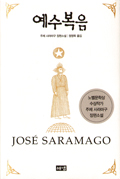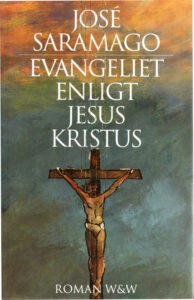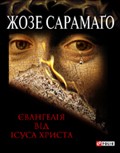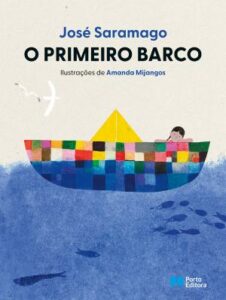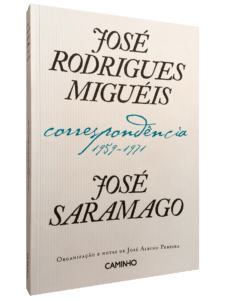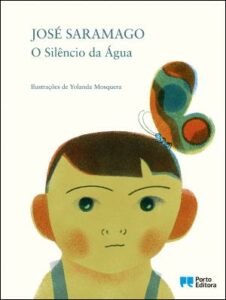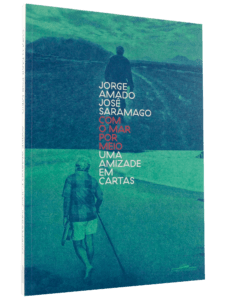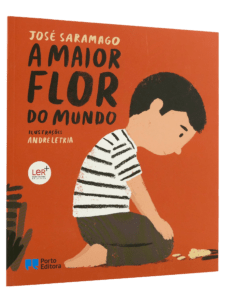The Gospel According to Jesus Christ
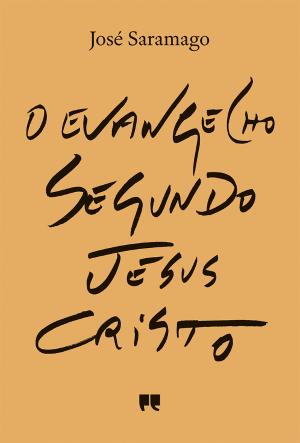
It's a novel, nothing more. A very daring novel, an honest book, a clean book, that will certainly confuse many people, and will also outrage quite a few.
Foundation
Awards for the work:
1992. Grand Prize for Fiction and Novel from the Portuguese Writers' Association. Portugal.
Portugal
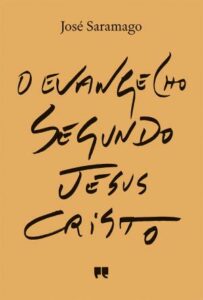
2017 (1st edition at Porto Editora; 13th edition)
Language
Portuguese
The calligraphy on the cover is by the writer and journalist Clara Ferreira Alves
"The history of men is the history of their disagreements with God, neither does he understand us, nor do we understand him."
Foundation
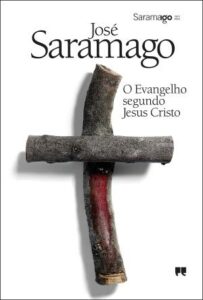
«"For me, the hard core of the novel [The Gospel According to Jesus ChristThis passage is when Jesus, at fourteen years old, goes to the temple in Jerusalem to speak about guilt and responsibility. He doesn't find a doctor, but rather a scribe. In the book, Jesus inherits the guilt of his father, who failed to save the children [in the episode of the massacre of the innocents]. When he asks the scribe about this guilt, the scribe tells him: "Guilt is a wolf that devours the father as it devours the son." That is to say, the belief implies that children inherit the guilt of their parents. From a certain point on, it is no longer known what the concrete guilt is. The feeling of guilt, which we don't know why or how it was born, how it became ingrained in us, is much worse than concrete guilt. Then, Jesus asks him: "Were you also devoured?" And the scribe replies: "Not only devoured, but also vomited out." The relationship with God is based on guilt, as is fundamentally the case throughout Christianity and Judaism.“
Foundation
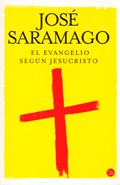
Leya
2011, 32nd ed.
Language
Portuguese
«"It is José Saramago's most controversial work and the one that, indirectly, led him to leave Portugal and take refuge on the Spanish island of Lanzarote. The disagreement with the then Undersecretary of State for Culture, Sousa Lara, who considered the book offensive to Portuguese Catholic tradition and removed it from the list of the European Literature Prize, has gone down in history. With a Joseph devastated by having fled and left the children of Bethlehem in the hands of Herod's assassins; with a Mary bent over and described, right at the beginning of the book, in the very act of meeting a man; with a fearful Jesus, a generous Judas, a voluptuous Magdalene, a vengeful God and a sympathetic Devil, no other reaction was to be expected from the more sensitive and devout souls of Portuguese Catholicism. And truly viperous are the various pages where the Portuguese writer meticulously describes the names and the manner in which the martyrs of the first centuries of Christianity died." Thus were written the heretical Gospels according to Saramago, to the irritation of many and the pleasure of some. As is fitting.» (Diário de Notícias, October 9, 1998) «Since many have undertaken to compile a narrative of the events that have taken place among us, just as those who from the beginning were eyewitnesses and servants of the word have handed them down to us, I myself, having carefully investigated everything from the beginning, decided to write it down for you in an orderly account, most excellent Theophilus, so that you may know the certainty of the things you have been taught.» (Luke 1:1-4)
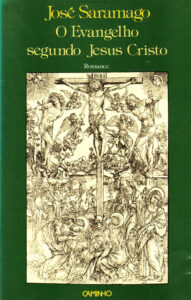
Editorial Path
1991
Language
Portuguese
«"It is José Saramago's most controversial work and the one that, indirectly, led him to leave Portugal and take refuge on the Spanish island of Lanzarote. The disagreement with the then Undersecretary of State for Culture, Sousa Lara, who considered the book offensive to Portuguese Catholic tradition and removed it from the list of the European Literature Prize, has gone down in history. With a Joseph devastated by having fled and left the children of Bethlehem in the hands of Herod's assassins; with a Mary bent over and described, right at the beginning of the book, in the very act of meeting a man; with a fearful Jesus, a generous Judas, a voluptuous Magdalene, a vengeful God and a sympathetic Devil, no other reaction was to be expected from the more sensitive and devout souls of Portuguese Catholicism. And truly viperous are the various pages where the Portuguese writer meticulously describes the names and the manner in which the martyrs of the first centuries of Christianity died." Thus were written the heretical Gospels according to Saramago, to the irritation of many and the pleasure of some. As is fitting.» (Diário de Notícias, October 9, 1998) «Since many have undertaken to compile a narrative of the events that have taken place among us, just as those who from the beginning were eyewitnesses and servants of the word have handed them down to us, I myself, having carefully investigated everything from the beginning, decided to write it down for you in an orderly account, most excellent Theophilus, so that you may know the certainty of the things you have been taught.» (Luke 1:1-4)
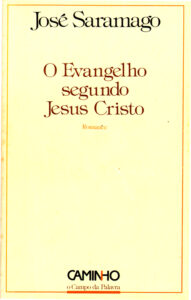
Editorial Path
1991
Language
Portuguese
«"It is José Saramago's most controversial work and the one that, indirectly, led him to leave Portugal and take refuge on the Spanish island of Lanzarote. The disagreement with the then Undersecretary of State for Culture, Sousa Lara, who considered the book offensive to Portuguese Catholic tradition and removed it from the list of the European Literature Prize, has gone down in history. With a Joseph devastated by having fled and left the children of Bethlehem in the hands of Herod's assassins; with a Mary bent over and described, right at the beginning of the book, in the very act of meeting a man; with a fearful Jesus, a generous Judas, a voluptuous Magdalene, a vengeful God and a sympathetic Devil, no other reaction was to be expected from the more sensitive and devout souls of Portuguese Catholicism. And truly viperous are the various pages where the Portuguese writer meticulously describes the names and the manner in which the martyrs of the first centuries of Christianity died." Thus were written the heretical Gospels according to Saramago, to the irritation of many and the pleasure of some. As is fitting.» (Diário de Notícias, October 9, 1998) «Since many have undertaken to compile a narrative of the events that have taken place among us, just as those who from the beginning were eyewitnesses and servants of the word have handed them down to us, I myself, having carefully investigated everything from the beginning, decided to write it down for you in an orderly account, most excellent Theophilus, so that you may know the certainty of the things you have been taught.» (Luke 1:1-4)
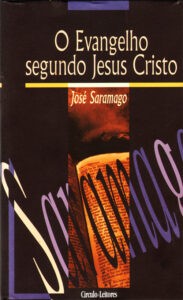
Circle of Readers
1991
Language
Portuguese
Circle of Readers
1991
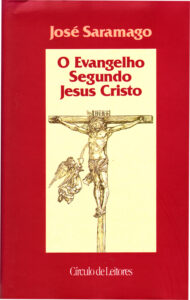
Circle of Readers
1991
Language
Portuguese
Circle of Readers
1991
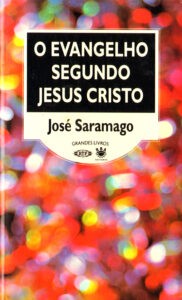
RBA
1995
Language
Portuguese
RBA
1995
Albania
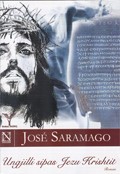
Sikur José Saramago të kishte jetuar disa shekuj më parë, pa asnjë dyshim që ky ungjill i pestë do t'i kishte marrë mbi vete rrufetë e Kishës dhe do t'i kishte kushtuar turrën e druve. Por, të kundërshtosh sot një histori, që prej dy mijëvjeçarëve është pjesë e së shenjtës, është kujtesë simbolike dhe model i qytetërimit tonë; ajo nuk përbën më kerezi apo balsfemi. Megjithatë, ende vende dhe fe të tjera nuk ngurrojnë të japin vendime të pamëshirshme vdekjeje kundër poetëve dhe poezisë. Por a është me të vërtetë caku i lirisë aq i madh sa duam ta besojmë? Kjo është pyetja që shtron këtu Saramagoja, duke e bërë Jezusin, këtë bir të Zotit që nuk donte të ishte i tillë, viktimë flijuese dhe instrument nga më absolutët të pushteteve, siç është edhe ideja and Zotit, kundër të cilit çdo rebelim është i pamundur. Ashtu si revolucionet, fetë hanë fëmijët e tyre, sado të pafajshëm të jenë. Në këtë ungjill, që tregon fëmijërinë dhe jetën vetjake të Jezusit në një dramë romaneske madhështore, duke përzierë historinë, mitin dhe trillimin, Saramagoja fton lexuesin të marrë pjesë në debatin voltarian, ku jepen Zoti, Djalli dhe Jezusi, duke mos qenë asnjëri ai që beson se është. Poezia e autorit dhe ironia e tregimtarit bashkohen në një stil madhështor, një nga më të përsosurit dhe më mjeshtërorët e letërsisë së sotme europiane dhe asaj botërore.
Germany
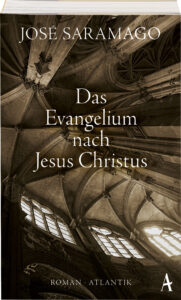
In José Saramagos Version der Geschichte Jesu trifft man auf eine Christusfigur, die durch und durch menschliche Züge aufweist: Lebenshungrig und sinnenfroh, aber auch ängstlich und zweifelnd geht sie durch die Welt. Der bedeutende portugiesische Schriftsteller rüttelt in seiner gewagten Interpretation der “Heilandsgeschichte” an den Fundamenten unserer Kultur und stellt mit beeindruckender Radikalität Geschichte, Religion und Legende in Frage.
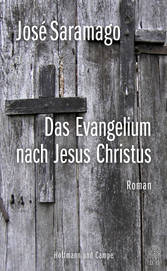
In José Saramagos Version der Geschichte Jesu trifft man auf eine Christusfigur, die durch und durch menschliche Züge aufweist: Lebenshungrig und sinnenfroh, aber auch ängstlich und zweifelnd geht sie durch die Welt. Der bedeutende portugiesische Schriftsteller rüttelt in seiner gewagten Interpretation der “Heilandsgeschichte” an den Fundamenten unserer Kultur und stellt mit beeindruckender Radikalität Geschichte, Religion und Legende in Frage.
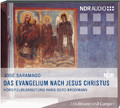
Eine Reportage, die den Himmel auf die Erde holt. Jesus erscheint als Suchender und sündiger Mensch. Er trägt die Schuld seines Vaters Josef mit sich, der, um seinen Sohn zu retten, die Einwohner Bethlehems nicht vor der bevorstehenden Ermordung ihrer Kinder gewarnt hat. Der Menschensohn ist nur eine Figur in Gottes großem Spiel. Saramago stellte in seinem 1991 erschienenen Roman das Evangelium in einen religions-kritischen Zusammenhang, der aktueller denn je ist.
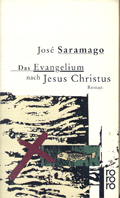
Jesus als “Mensch unter Menschen” – lebenshungrig und voller Neugierde, sinnenfroh und genießerisch, manchmal aber auch ängstlich und unsicher. José Saramago gibt in seiner bisweilen skandalösen, stets aber glaubwürdigen “Heilandsgeschichte” den bekannten Ereignissen immer wieder überraschende, phantasievolle neue Wendungen. Er rüttelt an den Fundamenten unserer Kultur und stellt mit beeindruckender Radikalität Geschichte, Religion und Legende in Frage.
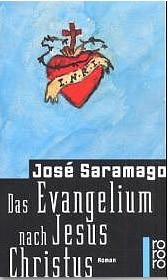
Jesus als “Mensch unter Menschen” – lebenshungrig und voller Neugierde, sinnenfroh und genießerisch, manchmal aber auch ängstlich und unsicher. José Saramago gibt in seiner bisweilen skandalösen, stets aber glaubwürdigen “Heilandsgeschichte” den bekannten Ereignissen immer wieder überraschende, phantasievolle neue Wendungen. Er rüttelt an den Fundamenten unserer Kultur und stellt mit beeindruckender Radikalität Geschichte, Religion und Legende in Frage.
Argentina
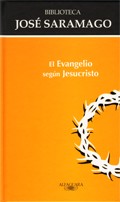
The Evangel according to Jesus Christ is enough to give Saramago a place in the universal library and in the memory of men. THE NATION
El Evangelio según Jesucristo responds to the desire of a man and a writer to excavate the roots of his own civilization, in the mystery of his tradition, to extract the essential questions.
Who is this our God, first Hebrew and now Christian, who wants blood, death, so that the balance of a world that is nourished only by its laws is restored?
El Evangelio de José Saramago is all like that, tragically problematic, and it would be absurd to condemn it with laws that are not its own laws, literary, poetic and philosophical. Here we do not deny the divine, the latent religion in the heart of every man: what we have to do is interrogate it, question it, accuse it. Passionately, religiously. Like Milton, situated on the side of the loser, who is always, we never forget him, a fallen angel. LUCIANA STEGAGNO PICCHIO
Bangladesh
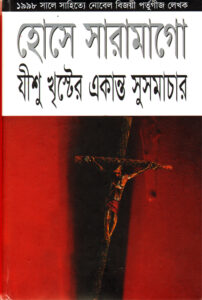
Book Club
2005
Language
Bengali
Book Club
2005
Bosnia and Herzegovina
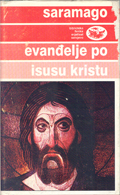
Svjetlost
2000 (Trans.: Nijaz Čardaklija)
Language
Bosnian
Svjetlost
2000 (Trans.: Nijaz Čardaklija)
Brazil
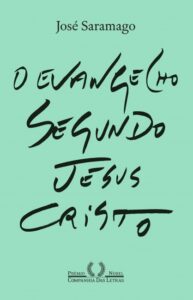
The calligraphy on the cover is by photographer Sebastião Salgado.
A masterful and controversial novel by the 1998 Nobel Prize in Literature winner.
“"The son of Joseph and Mary was born like all sons of men, soiled with his mother's blood, slimy with her mucus, and suffering in silence. He cried because they made him cry, and he will cry for that same and only reason."”
Everyone knows the story of Joseph and Mary's son, but in this narrative it gains so much beauty and poignancy that it's as if it were being told for the first time. In the words of José Paulo Paes: "Interested less in the omnipotence of the divine than in the fragile but tenacious resistance of the human, Saramago's masterful art excels in giving form to the preliminaries and the culmination of the Passion drama.".
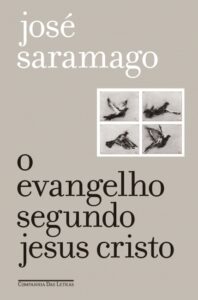
Special edition with a preface by Andrea Del Fuego and some reading suggestions related to the novel.
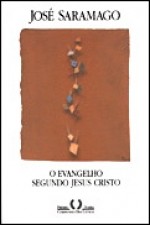
“The son of Joseph and Mary was born like all sons of men, covered in his mother's blood, viscous with her mucus, and suffering in silence. He cried because they made him cry, and he will cry for that same and only reason.” Everyone knows the story of the son of Joseph and Mary, but in this narrative it gains so much beauty and poignancy that it is as if it were being told for the first time. In the words of José Paulo Paes: “Interested less in the omnipotence of the divine than in the fragile but tenacious resistance of the human, Saramago's masterful art excels in giving body to the preliminaries and the culmination of the drama of the Passion.”.
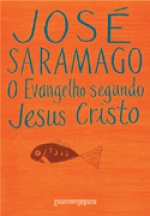
“The son of Joseph and Mary was born like all sons of men, covered in his mother's blood, viscous with her mucus, and suffering in silence. He cried because they made him cry, and he will cry for that same and only reason.” Everyone knows the story of the son of Joseph and Mary, but in this narrative it gains so much beauty and poignancy that it is as if it were being told for the first time. In the words of José Paulo Paes: “Interested less in the omnipotence of the divine than in the fragile but tenacious resistance of the human, Saramago's masterful art excels in giving body to the preliminaries and the culmination of the drama of the Passion.”.
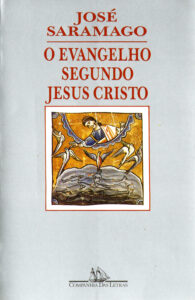
“The son of Joseph and Mary was born like all sons of men, covered in his mother's blood, viscous with her mucus, and suffering in silence. He cried because they made him cry, and he will cry for that same and only reason.” Everyone knows the story of the son of Joseph and Mary, but in this narrative it gains so much beauty and poignancy that it is as if it were being told for the first time. In the words of José Paulo Paes: “Interested less in the omnipotence of the divine than in the fragile but tenacious resistance of the human, Saramago's masterful art excels in giving body to the preliminaries and the culmination of the drama of the Passion.”.
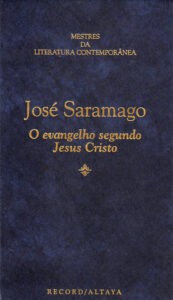
Record/Altaya
1995
Language
Portuguese
Record/Altaya
1995
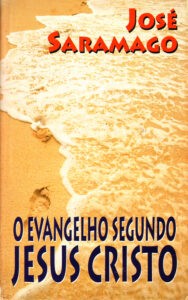
Book Circle
Language
Portuguese
Book Circle
Bulgaria
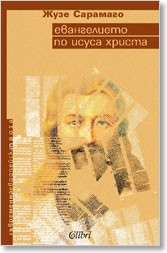
На Йосиф и Мария се ражда първороден син, Исус. Той, всички знаем, е обречен да дава отпор на дяволски изкушения, да обещава смърт и безсмъртие в притчи, да ходи по водата, да бъде разпнат. Като “стандартите” в джаза, онези евъргрийни с гарантиран успех и у най-несантименталте слушатели, и тази история е стара, общодостъпна и изпитана (достатъчно е да споменем Томас Ман с “Йосиф и неговите братя”, Булгаков с “Майстора и Маргарита”, Гор Видал с “На живо от Голгота”). рамките на очакваните светски отклонения от каноничния ход на нещата. Неговата ексцентричност не разтърсва, а с микроскопични размествания в хронологията на познатите събития и значението на познатите персонажи едва усетно пренарежда мозайката на финала. How did you tell me what you said: другите, защото мисли, не защото вярва; не мистична криза, а земна любов очиства Мария Магдалина; Бог е този, който отказва да се раздели с дявола; Исус целува Юда и го праща да го предаде; с финалната си саможертва Христос спасява не душите на хората, а реномето на своя Отец. Евангелие по вкуса на професионалния читател на романи – в това не би имало нищо изключително, ако не беше гласът на разказвача. Именно на него се дължи ценността на книгата, в него е оригиналният принос in на Сарамагу – уверен, умерен, топъл глас, разпознаваем и прочувствен, с безгранична милост към слабия и, тук-таме, с изумителни живи картини от думи. Например тази: като момче Исус отива да принесе агне в Храма и не смогва – то е крехко и зависи от него, а жертвата е толкова ненужна. Агнето пораства и става овца – обикновена, но негова, на Исус. “Когато някой иска овца, това е доказателство, че съществува”, имаше такава малка смешна фраза у Екзюпери, когато в пустинята малкият принц иска да му нарисуват овца. Един ден, в пустинята на Сарамагу, Бог се явява на Исус и изисква овцата в жертва. И Исус я принася. Трагедията с негово участие започва оттук.”Отче, отклони от мене тая чаша… Трябва да я изпиеш заради моята власт и твоята слава… Не искам тази слава… Но аз искам тази власт!” Исус беседва за страха с Бог и с дявола в една лодка – четирийсет дни в средата на гъста мъгла – и Бог, Онзи, който говори за бъдещето в минало време, изрежда нещастията, които ще се случат в Христовото име. Един от най-силните моменти на романа са няколкото страници, изписани от горе до долу с имена на мъченици и причините за тяхната смърт: списъци с изтребени воини на вярата, масов гроб на мощите на християнския фетишизъм. “It's not a dream, it's not a problem for you”, and it's a message for you, “Dумите, които ще кажеш, са предопределени, те чакат там, където ще идеш”. Сарамагу се ангажира с оценки и изявления. Но при него Лазар не оживява. Бесовете не измират със свинете. Възкресението го няма отсам края на романа. How do I know what I'm saying?
Korea
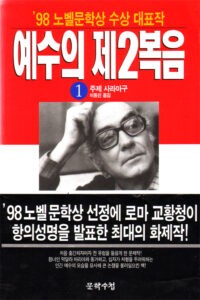
Print Korea Agency
1999 (1st)
Language
Korean
Print Korea Agency
1999 (1st)

Print Korea Agency
1999 (2nd)
Language
Korean
Print Korea Agency
1999 (2nd)
Croatia
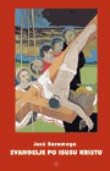
“Evanđelje po Isusu Kristu” najkontroverzniji je roman portugalskog nobelovca Joséa Saramaga.Radnja Romana smještena je u okvir od Isusova rođenja do smrti, tako da Saramagova briljantna “korekcija”, u ovome slučaju biblijske istine, dolazi do punog izražaja. Unoseći u taj poznati okvir ono imaginarno, moguće događaje i ironiju, autor proširuje i obogaćuje dimenzije naše stvarnosti ponekad ljudski ganutljivo, a ponekad provokativni i smiono.
Cuba
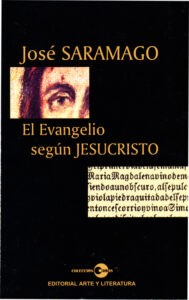
Editorial Art and Literature
2004 (Translated by Basilio Losada)
Denmark
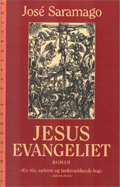
»En stor, rig og stofmættet bog, der helt ind i selve sin massive sprogliggørelse er fyldt til randen med de evige eksistentielle spørgsmål om menneskets forhold til det guddommelige. José Saramago fortæller den kendte historie om Jesu undfangelse, fødsel, opvækst og korte dramatisk afsluttede liv med sit blik rettet mod lidelsen«Henrik Wivel, Berlingske Tidende»Var Saramago ikke netop så gevaldigt menneskelig, måtte vi nok kalde ham in guddommelig fortæller«
Søren Vinterberg, Politics
Spain
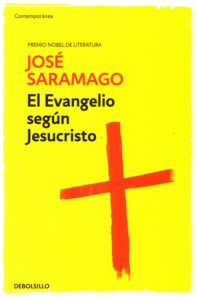
Alfaguara / Penguin Random House
2015 (DeBolsillo — Contemporary) (Trans.: Basilio Losada)
Language
Spanish
The gospel according to Jesus Christ, which so surprised the Catholic world, presents a worldly vision of the events relating to Jesus: the circumstances of his birth, the discovery of love with María Magdalena, the anguish of knowing what is the true meaning of his existence before the eyes of God...
I believe that many people have tried to write the story of what happened between us, according to what has been transmitted to us by those who, from the beginning, were ocular testimonies and ministers of the word, it has also seemed to me, after informing me exactly from the origins, write it down neatly, excellent Teófilo, so that You know the firmness of the doctrine you have received.
Luke 1:1-4
«The gospel according to Jesus Christ responds to the desire of a man and a writer to excavate the roots of his own civilization, in the mystery of his tradition, to extract the essential questions. Who is this our God, first Hebrew and now Christian, who wants the blood, the death, so that the balance of a world that is nourished only by its leyes is restored? How can the new law be the law of Love if the mortgage of eternal damnation still weighs on the man? How can a man think of himself as a divine creature worthy of immortality, if throughout his existence he must submit to a law of terror that pre-exists and is external to him? Why should we fear eternal punishment when the punishment, for the just, should be in this life, in remorse and in the consciousness of our indignity? The gospel of José Saramago is all like that, tragically problematic, and it would be absurd to condemn it with laws, which are not its own laws, literary, poetic and philosophical. Here we do not deny the divine, the latent religion in the heart of every man: what we have to do is interrogate it, question it, accuse it. Passionately, religiously. Like Milton, situated on the side of the loser, who is always, we never forget him, a fallen angel.»
Luciana Stegagno Picchio
This new edition of El evangelio según Jesucristo includes, as an epilogue, an entry from José Saramago's blog dedicated to María Magdalena.
«My book is a truth, a story of Jesus meeting God», says José Saramago, who puts all possible doubts in the head of Christ, a man chosen for a mission he never expected to accomplish.
There is a review…
«The gospel according to Jesus Christ is enough to give Saramago a place in the universal library and in the memory of men.»
The Nation
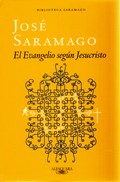
Alfaguara / Penguin Random House
2011 (Saramago Library Collection) (Translated by Basilio Losada)
Language
Spanish
The gospel according to Jesus Christ, which so surprised the Catholic world, presents a worldly vision of the events relating to Jesus: the circumstances of his birth, the discovery of love with María Magdalena, the anguish of knowing what is the true meaning of his existence before the eyes of God...
I believe that many people have tried to write the story of what happened between us, according to what has been transmitted to us by those who, from the beginning, were ocular testimonies and ministers of the word, it has also seemed to me, after informing me exactly from the origins, write it down neatly, excellent Teófilo, so that You know the firmness of the doctrine you have received.
Luke 1:1-4
«The gospel according to Jesus Christ responds to the desire of a man and a writer to excavate the roots of his own civilization, in the mystery of his tradition, to extract the essential questions. Who is this our God, first Hebrew and now Christian, who wants the blood, the death, so that the balance of a world that is nourished only by its leyes is restored? How can the new law be the law of Love if the mortgage of eternal damnation still weighs on the man? How can a man think of himself as a divine creature worthy of immortality, if throughout his existence he must submit to a law of terror that pre-exists and is external to him? Why should we fear eternal punishment when the punishment, for the just, should be in this life, in remorse and in the consciousness of our indignity? The gospel of José Saramago is all like that, tragically problematic, and it would be absurd to condemn it with laws, which are not its own laws, literary, poetic and philosophical. Here we do not deny the divine, the latent religion in the heart of every man: what we have to do is interrogate it, question it, accuse it. Passionately, religiously. Like Milton, situated on the side of the loser, who is always, we never forget him, a fallen angel.»
Luciana Stegagno Picchio
This new edition of El evangelio según Jesucristo includes, as an epilogue, an entry from José Saramago's blog dedicated to María Magdalena.
«My book is a truth, a story of Jesus meeting God», says José Saramago, who puts all possible doubts in the head of Christ, a man chosen for a mission he never expected to accomplish.
There is a review…
«The gospel according to Jesus Christ is enough to give Saramago a place in the universal library and in the memory of men.»
The Nation

Alfaguara / Penguin Random House
2000 (Punto de lectura - pocket edition) (Trans.: Basilio Losada)
Language
Spanish
The gospel according to Jesus Christ, which so surprised the Catholic world, presents a worldly vision of the events relating to Jesus: the circumstances of his birth, the discovery of love with María Magdalena, the anguish of knowing what is the true meaning of his existence before the eyes of God...
I believe that many people have tried to write the story of what happened between us, according to what has been transmitted to us by those who, from the beginning, were ocular testimonies and ministers of the word, it has also seemed to me, after informing me exactly from the origins, write it down neatly, excellent Teófilo, so that You know the firmness of the doctrine you have received.
Luke 1:1-4
«The gospel according to Jesus Christ responds to the desire of a man and a writer to excavate the roots of his own civilization, in the mystery of his tradition, to extract the essential questions. Who is this our God, first Hebrew and now Christian, who wants the blood, the death, so that the balance of a world that is nourished only by its leyes is restored? How can the new law be the law of Love if the mortgage of eternal damnation still weighs on the man? How can a man think of himself as a divine creature worthy of immortality, if throughout his existence he must submit to a law of terror that pre-exists and is external to him? Why should we fear eternal punishment when the punishment, for the just, should be in this life, in remorse and in the consciousness of our indignity? The gospel of José Saramago is all like that, tragically problematic, and it would be absurd to condemn it with laws, which are not its own laws, literary, poetic and philosophical. Here we do not deny the divine, the latent religion in the heart of every man: what we have to do is interrogate it, question it, accuse it. Passionately, religiously. Like Milton, situated on the side of the loser, who is always, we never forget him, a fallen angel.»
Luciana Stegagno Picchio
This new edition of El evangelio según Jesucristo includes, as an epilogue, an entry from José Saramago's blog dedicated to María Magdalena.
«My book is a truth, a story of Jesus meeting God», says José Saramago, who puts all possible doubts in the head of Christ, a man chosen for a mission he never expected to accomplish.
There is a review…
«The gospel according to Jesus Christ is enough to give Saramago a place in the universal library and in the memory of men.»
The Nation
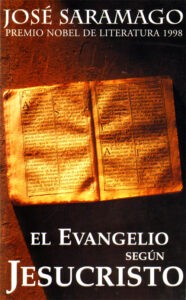
The gospel according to Jesus Christ, which so surprised the Catholic world, presents a worldly vision of the events relating to Jesus: the circumstances of his birth, the discovery of love with María Magdalena, the anguish of knowing what is the true meaning of his existence before the eyes of God...
I believe that many people have tried to write the story of what happened between us, according to what has been transmitted to us by those who, from the beginning, were ocular testimonies and ministers of the word, it has also seemed to me, after informing me exactly from the origins, write it down neatly, excellent Teófilo, so that You know the firmness of the doctrine you have received.
Luke 1:1-4
«The gospel according to Jesus Christ responds to the desire of a man and a writer to excavate the roots of his own civilization, in the mystery of his tradition, to extract the essential questions. Who is this our God, first Hebrew and now Christian, who wants the blood, the death, so that the balance of a world that is nourished only by its leyes is restored? How can the new law be the law of Love if the mortgage of eternal damnation still weighs on the man? How can a man think of himself as a divine creature worthy of immortality, if throughout his existence he must submit to a law of terror that pre-exists and is external to him? Why should we fear eternal punishment when the punishment, for the just, should be in this life, in remorse and in the consciousness of our indignity? The gospel of José Saramago is all like that, tragically problematic, and it would be absurd to condemn it with laws, which are not its own laws, literary, poetic and philosophical. Here we do not deny the divine, the latent religion in the heart of every man: what we have to do is interrogate it, question it, accuse it. Passionately, religiously. Like Milton, situated on the side of the loser, who is always, we never forget him, a fallen angel.»
Luciana Stegagno Picchio
This new edition of El evangelio según Jesucristo includes, as an epilogue, an entry from José Saramago's blog dedicated to María Magdalena.
«My book is a truth, a story of Jesus meeting God», says José Saramago, who puts all possible doubts in the head of Christ, a man chosen for a mission he never expected to accomplish.
There is a review…
«The gospel according to Jesus Christ is enough to give Saramago a place in the universal library and in the memory of men.»
The Nation
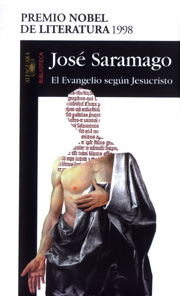
The gospel according to Jesus Christ, which so surprised the Catholic world, presents a worldly vision of the events relating to Jesus: the circumstances of his birth, the discovery of love with María Magdalena, the anguish of knowing what is the true meaning of his existence before the eyes of God...
I believe that many people have tried to write the story of what happened between us, according to what has been transmitted to us by those who, from the beginning, were ocular testimonies and ministers of the word, it has also seemed to me, after informing me exactly from the origins, write it down neatly, excellent Teófilo, so that You know the firmness of the doctrine you have received.
Luke 1:1-4
«The gospel according to Jesus Christ responds to the desire of a man and a writer to excavate the roots of his own civilization, in the mystery of his tradition, to extract the essential questions. Who is this our God, first Hebrew and now Christian, who wants the blood, the death, so that the balance of a world that is nourished only by its leyes is restored? How can the new law be the law of Love if the mortgage of eternal damnation still weighs on the man? How can a man think of himself as a divine creature worthy of immortality, if throughout his existence he must submit to a law of terror that pre-exists and is external to him? Why should we fear eternal punishment when the punishment, for the just, should be in this life, in remorse and in the consciousness of our indignity? The gospel of José Saramago is all like that, tragically problematic, and it would be absurd to condemn it with laws, which are not its own laws, literary, poetic and philosophical. Here we do not deny the divine, the latent religion in the heart of every man: what we have to do is interrogate it, question it, accuse it. Passionately, religiously. Like Milton, situated on the side of the loser, who is always, we never forget him, a fallen angel.»
Luciana Stegagno Picchio
This new edition of El evangelio según Jesucristo includes, as an epilogue, an entry from José Saramago's blog dedicated to María Magdalena.
«My book is a truth, a story of Jesus meeting God», says José Saramago, who puts all possible doubts in the head of Christ, a man chosen for a mission he never expected to accomplish.
There is a review…
«The gospel according to Jesus Christ is enough to give Saramago a place in the universal library and in the memory of men.»
The Nation
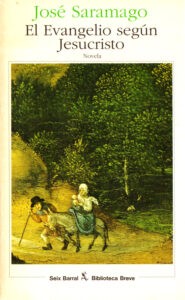
Seix Barral
1992 (Translated by Basilio Losada)
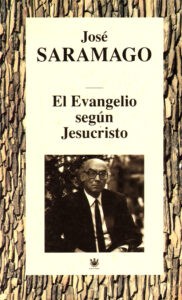
RBA Publishers
1994 (Translated by Basilio Losada)
Language
Spanish
RBA Publishers
1994 (Translated by Basilio Losada)
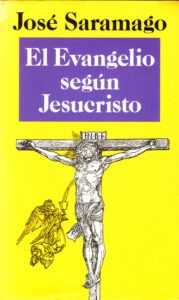
Readers' Circle
1994 (Translated by Basilio Losada)
Language
Spanish
Readers' Circle
1994 (Translated by Basilio Losada)
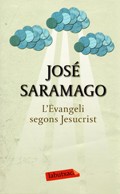
«L'Evangeli segons Jesucrist is an essential work in contemporary universal literature and, sensibly, the month that Saramago wrote. Luciana Stegagno Picchio – recognized Italian Lusitanist – has written about this work: «L'Evangeli segons Jesucrist responds to the design of a home in from a writer to excavate ends within the frameworks of civil society itself, in the mystery of traditional seva, to extreure 'n les essential questions. What is our first God, the first Hebrew in Christ, who returns the blood, the death, why I continue to restore the balance of a world that names are nodreix de les seves lleis? In L'Evangeli de José Saramago tot is tragically problematic, it would be absurd to condemn him even though he does not follow his own books, literature, poetry and philosophy. It is not negating allò diví, not the religion latent in the color of each man: he is the one who is interrogating, questioning, accusing. Passionately, religiously.’
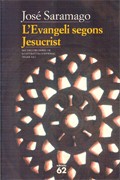
«L'Evangeli segons Jesucrist is an essential work in contemporary universal literature and, sensibly, the month that Saramago wrote. Luciana Stegagno Picchio – recognized Italian Lusitanist – has written about this work: «L'Evangeli segons Jesucrist responds to the design of a home in from a writer to excavate ends within the frameworks of civil society itself, in the mystery of traditional seva, to extreure 'n les essential questions. What is our first God, the first Hebrew in Christ, who returns the blood, the death, why I continue to restore the balance of a world that names are nodreix de les seves lleis? In L'Evangeli de José Saramago tot is tragically problematic, it would be absurd to condemn him even though he does not follow his own books, literature, poetry and philosophy. It is not negating allò diví, not the religion latent in the color of each man: he is the one who is interrogating, questioning, accusing. Passionately, religiously.’
USA
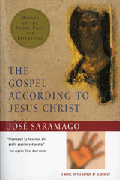
A wry, fictional account of the life of Christ by Nobel laureate José Saramago
A brilliant skeptic, José Saramago envisions the life of Jesus Christ and the story of his Passion as things of this earth: A child crying, the caress of a woman half asleep, the bleat of a goat, a prayer uttered in the grayish morning light. His idea of the Holy Family reflects the real complexities of any family, and—as only Saramago can—he imagines them with tinges of vision, dream, and omen. The result is a deft psychological portrait that moves between poetry and irony, spirituality and irreverence of a savior who is at once the Son of God and a young man. In this provocative, tender novel, the subject of wide critical discussion and wonder, Saramago questions the meaning of God, the foundations of the Church, and human existence itself. This is a skeptic's journey into the meaning of God and of human existence. At once an ironic rendering of the life of Christ and a beautiful novel, Saramago's tale has sparked intense discussion about the meaning of Christianity and the Church as an institution.
“Fiction that engages the mind as well as the spirit.”
Kirkus
“Illuminated by ferocious wit, gentle passion and poetry.”
LA Times Book Review
“Mixes magic, myth and reality into a potent brew.”
Booklist
“Enough to assure [Saramago] a place in the universal library and in human memory.”
The Nation
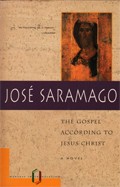
A wry, fictional account of the life of Christ by Nobel laureate José Saramago
A brilliant skeptic, José Saramago envisions the life of Jesus Christ and the story of his Passion as things of this earth: A child crying, the caress of a woman half asleep, the bleat of a goat, a prayer uttered in the grayish morning light. His idea of the Holy Family reflects the real complexities of any family, and—as only Saramago can—he imagines them with tinges of vision, dream, and omen. The result is a deft psychological portrait that moves between poetry and irony, spirituality and irreverence of a savior who is at once the Son of God and a young man. In this provocative, tender novel, the subject of wide critical discussion and wonder, Saramago questions the meaning of God, the foundations of the Church, and human existence itself. This is a skeptic's journey into the meaning of God and of human existence. At once an ironic rendering of the life of Christ and a beautiful novel, Saramago's tale has sparked intense discussion about the meaning of Christianity and the Church as an institution.
“Fiction that engages the mind as well as the spirit.”
Kirkus
“Illuminated by ferocious wit, gentle passion and poetry.”
LA Times Book Review
“Mixes magic, myth and reality into a potent brew.”
Booklist
“Enough to assure [Saramago] a place in the universal library and in human memory.”
The Nation
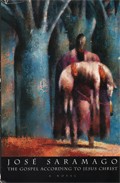
A wry, fictional account of the life of Christ by Nobel laureate José Saramago
A brilliant skeptic, José Saramago envisions the life of Jesus Christ and the story of his Passion as things of this earth: A child crying, the caress of a woman half asleep, the bleat of a goat, a prayer uttered in the grayish morning light. His idea of the Holy Family reflects the real complexities of any family, and—as only Saramago can—he imagines them with tinges of vision, dream, and omen. The result is a deft psychological portrait that moves between poetry and irony, spirituality and irreverence of a savior who is at once the Son of God and a young man. In this provocative, tender novel, the subject of wide critical discussion and wonder, Saramago questions the meaning of God, the foundations of the Church, and human existence itself. This is a skeptic's journey into the meaning of God and of human existence. At once an ironic rendering of the life of Christ and a beautiful novel, Saramago's tale has sparked intense discussion about the meaning of Christianity and the Church as an institution.
“Fiction that engages the mind as well as the spirit.”
Kirkus
“Illuminated by ferocious wit, gentle passion and poetry.”
LA Times Book Review
“Mixes magic, myth and reality into a potent brew.”
Booklist
“Enough to assure [Saramago] a place in the universal library and in human memory.”
The Nation
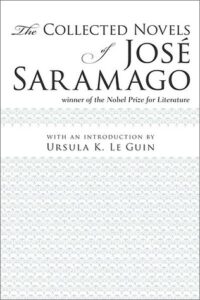
This collection, available exclusively in e-book form, brings together the twelve novels (and one novella) of the great Portuguese writer José Saramago, with an introductory essay by Ursula Le Guin. From Saramago's early work, like the enchanting Baltasar & Blimunda and the controversial Gospel According to Jesus Christ, through his masterpiece Blindness and its sequel Seeing, to his later fables of politics, chance, history, and love, like All the Names and Death with Interruptions, this volume showcases the range and depth of Saramago's career, his inimitable narrative voice, and his vast reserves of invention, humor, and understanding.
Finland
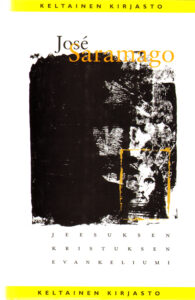
Tammi
1998 (suomi) (Trans.: Erkki Kirjalainen)
France
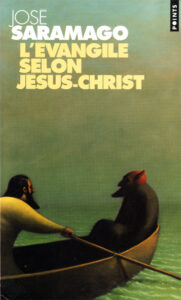
L'Evangile seal Jésus-Christ. If José Saramago avait vécu quelques siècles plus tôt, nul doute que ce cinquième évangile lui aurait valu les foudres de l'Eglise et le bûcher. Mais contredire aujourd'hui une histoire qui depuis deux millénaires appartient au domaine du sacré, est la mémoire symbolique et la matrice de notre civilization, n'apparaît plus comme relevant de l'hérésie ou du blasphème. Encore que d'autres pays et d'autres religions n'hésitent pas à pronounce d'impitoyables sentences de mort contre les poètes et la poésie. Mais notre margin de liberté est-elle aussi grande que nous voulons bien le croire? C'est la question que pose ici Saramago en faisant de Jésus, ce fils de Dieu qui ne voulait pas l'être, la victime sacrificielle et l'instrument du plus absolu des pouvoirs qu'est l'idée même de Dieu, et contre lequel toute rébellion est impossible. Comme les révolutions, les religions dévorent leurs enfants, aussi innocents soient-ils. Dans cet évangile qui retrace l'enfance et la vie privée de Jésus en un drame romanesque somptueux, mêlant histoire, myth et fiction. Saramago invites the teacher to participate in the debate that comes back to Dieu, le Diable et Jésus, chacun d'eux n'étant as cellui que l'on croit. La poésie de l'auteur et l'ironie du narrateur se rejoignent dans les arabesques et la polychromie d'une très grande écriture, une des plus accomplies et des plus maîtrisées de la littérature européenne d'aujourd'hui.
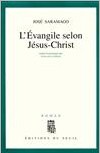
L'Evangile seal Jésus-Christ. If José Saramago avait vécu quelques siècles plus tôt, nul doute que ce cinquième évangile lui aurait valu les foudres de l'Eglise et le bûcher. Mais contredire aujourd'hui une histoire qui depuis deux millénaires appartient au domaine du sacré, est la mémoire symbolique et la matrice de notre civilization, n'apparaît plus comme relevant de l'hérésie ou du blasphème. Encore que d'autres pays et d'autres religions n'hésitent pas à pronounce d'impitoyables sentences de mort contre les poètes et la poésie. Mais notre margin de liberté est-elle aussi grande que nous voulons bien le croire? C'est la question que pose ici Saramago en faisant de Jésus, ce fils de Dieu qui ne voulait pas l'être, la victime sacrificielle et l'instrument du plus absolu des pouvoirs qu'est l'idée même de Dieu, et contre lequel toute rébellion est impossible. Comme les révolutions, les religions dévorent leurs enfants, aussi innocents soient-ils. Dans cet évangile qui retrace l'enfance et la vie privée de Jésus en un drame romanesque somptueux, mêlant histoire, myth et fiction. Saramago invites the teacher to participate in the debate that comes back to Dieu, le Diable et Jésus, chacun d'eux n'étant as cellui que l'on croit. La poésie de l'auteur et l'ironie du narrateur se rejoignent dans les arabesques et la polychromie d'une très grande écriture, une des plus accomplies et des plus maîtrisées de la littérature européenne d'aujourd'hui.
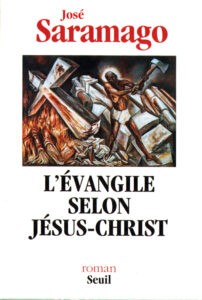
L'Evangile seal Jésus-Christ. If José Saramago avait vécu quelques siècles plus tôt, nul doute que ce cinquième évangile lui aurait valu les foudres de l'Eglise et le bûcher. Mais contredire aujourd'hui une histoire qui depuis deux millénaires appartient au domaine du sacré, est la mémoire symbolique et la matrice de notre civilization, n'apparaît plus comme relevant de l'hérésie ou du blasphème. Encore que d'autres pays et d'autres religions n'hésitent pas à pronounce d'impitoyables sentences de mort contre les poètes et la poésie. Mais notre margin de liberté est-elle aussi grande que nous voulons bien le croire? C'est la question que pose ici Saramago en faisant de Jésus, ce fils de Dieu qui ne voulait pas l'être, la victime sacrificielle et l'instrument du plus absolu des pouvoirs qu'est l'idée même de Dieu, et contre lequel toute rébellion est impossible. Comme les révolutions, les religions dévorent leurs enfants, aussi innocents soient-ils. Dans cet évangile qui retrace l'enfance et la vie privée de Jésus en un drame romanesque somptueux, mêlant histoire, myth et fiction. Saramago invites the teacher to participate in the debate that comes back to Dieu, le Diable et Jésus, chacun d'eux n'étant as cellui que l'on croit. La poésie de l'auteur et l'ironie du narrateur se rejoignent dans les arabesques et la polychromie d'une très grande écriture, une des plus accomplies et des plus maîtrisées de la littérature européenne d'aujourd'hui.
Georgia
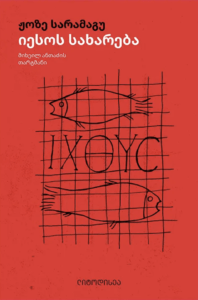
ჟოზე სარამაგუს (1922-2010) ნამდვილი გვარია დე სუზა. ის პორტუგალიის სოფელ აზინაგაში, გლეხის ოჯახში დაიბადა და მოგვიანებით ოჯახთან ერთად ლისაბონში გადავიდა საცხოვრებლად. ტექნიკური სასწავლებლის დასრულების შემდეგ მუშაობდა ავტოშემკეთებლად, შემდეგ თარჯიმნობა სცადა და ერთხანს ჟურნალისტიც იყო.
სარამაგუმ წერა 58 წლის ასაკში დაიწყო. ის მრავალი რომანის, პოემის, ზღაპრისა და სხვა ლიტერატურული ნაწარმოების ავტორია. მისი ყველაზე ცნობილი რომანი, “იესოს სახარება” 1991 წელს გამოიცა და სწრაფად მოუტანა ავტორს აღიარება. ამ ერთი შეხედვით სკანდალურ ნაწარმოებში აღწერილია იესოს დაბადება, ბავშვობა და სიყმაწვილე – გზა მისი ადამიანობიდან გაღმერთებამდე.
“იესოს სახარებას” მალევე მოჰყვა არაერთგვაროვანი შეფასება. ვატიკანმა ნაწარმოებს “მკრეხელური” უწოდა, მწერალი კი კანონიკურ სახარებათა პაროდიის დაწერისთვის მწვალებლად შერაცხა. თუმცა, იყო სხვაგვარი აზრიც – ლისაბონის კარდინალის სიტყვით, “არ არსებობს გონიერი მორწმუნე, რომელიც ამ რომანით არ აღფრთოვანდება”.
ასეა თუ ისე, “იესოს სახარებამ” განსაკუთრებული როლი შეასრულა ავტორის ბიოგრაფიაში და სწორედ მისი გამოქვეყნების შემდეგ გახდა სარამაგუ პირველი პორტუგალიურენოვანი მწერალი, რომელსაც ნობელის პრემია მიანიჭეს ლიტერატურაში.
Greece
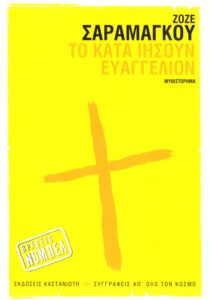
Kρατάτε στα χέρια σας ένα ευαγγέλιο. H διαφορά του από τα γνωστά Eυαγγέλια είναι ότι ο «ευαγγελιστής» Σαραµάγκου έχει τη δική του αιρετική αλλά απολύτως τα γεγονότα της Kαινής Διαθήκης. Tο βιβλίο όμως αυτό δεν είναι μια θεολογική πρόταση. and ανατροπές και οικείους χαρακτήρες, που ο συγγραφέας παρακολουθεί άγρυπνα, αποκαλύπτοντάς μας τις πιο απίθανες λεπτομέρειες της ζωής τους.
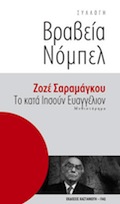
Kρατάτε στα χέρια σας ένα ευαγγέλιο. H διαφορά του από τα γνωστά Eυαγγέλια είναι ότι ο «ευαγγελιστής» Σαραµάγκου έχει τη δική του αιρετική αλλά απολύτως τα γεγονότα της Kαινής Διαθήκης. Tο βιβλίο όμως αυτό δεν είναι μια θεολογική πρόταση. and ανατροπές και οικείους χαρακτήρες, που ο συγγραφέας παρακολουθεί άγρυπνα, αποκαλύπτοντάς μας τις πιο απίθανες λεπτομέρειες της ζωής τους.
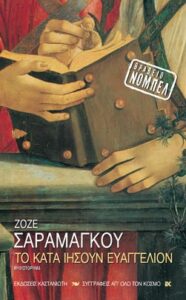
Kρατάτε στα χέρια σας ένα ευαγγέλιο. H διαφορά του από τα γνωστά Eυαγγέλια είναι ότι ο «ευαγγελιστής» Σαραµάγκου έχει τη δική του αιρετική αλλά απολύτως τα γεγονότα της Kαινής Διαθήκης. Tο βιβλίο όμως αυτό δεν είναι μια θεολογική πρόταση. and ανατροπές και οικείους χαρακτήρες, που ο συγγραφέας παρακολουθεί άγρυπνα, αποκαλύπτοντάς μας τις πιο απίθανες λεπτομέρειες της ζωής τους.
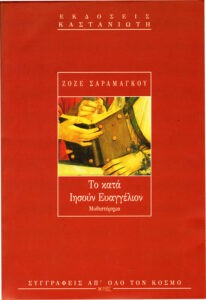
Kρατάτε στα χέρια σας ένα ευαγγέλιο. H διαφορά του από τα γνωστά Eυαγγέλια είναι ότι ο «ευαγγελιστής» Σαραµάγκου έχει τη δική του αιρετική αλλά απολύτως τα γεγονότα της Kαινής Διαθήκης. Tο βιβλίο όμως αυτό δεν είναι μια θεολογική πρόταση. and ανατροπές και οικείους χαρακτήρες, που ο συγγραφέας παρακολουθεί άγρυπνα, αποκαλύπτοντάς μας τις πιο απίθανες λεπτομέρειες της ζωής τους.
Netherlands
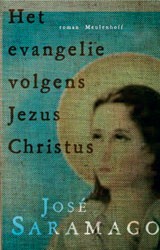
In de roman Het evangelie volgens Jezus Christus geeft Saramago zijn eigen versie van het Nieuwe Testament. Bij Saramago is Jezus Christus gewoon een menselijk wezen, dus ook begiftigd met seksualiteit. Maria Magdalena is zijn partner, die in het boek uitgroeit tot een heel krachtige, vitale vrouw. Ook de verhouding tussen God en Duivel komt op verrassende wijze in een nieuw licht te staan. Saramago's evangelie, het evangelie van een atheïst, geeft een zeer persoonlijke en tegendraadse interpretatie van de aloude tradities.'De schurk van dit evangelie is God zelf.' The Ribatejo
‘'Saramago dankt de Nobelprijs aan zijn verbeeldingskracht, de ironie die hij aan den dag legt en zijn grote vermogen met de mens mee te voelen.' Academy of Nobelprijs
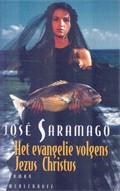
In de roman Het evangelie volgens Jezus Christus geeft Saramago zijn eigen versie van het Nieuwe Testament. Bij Saramago is Jezus Christus gewoon een menselijk wezen, dus ook begiftigd met seksualiteit. Maria Magdalena is zijn partner, die in het boek uitgroeit tot een heel krachtige, vitale vrouw. Ook de verhouding tussen God en Duivel komt op verrassende wijze in een nieuw licht te staan. Saramago's evangelie, het evangelie van een atheïst, geeft een zeer persoonlijke en tegendraadse interpretatie van de aloude tradities.'De schurk van dit evangelie is God zelf.' The Ribatejo
‘'Saramago dankt de Nobelprijs aan zijn verbeeldingskracht, de ironie die hij aan den dag legt en zijn grote vermogen met de mens mee te voelen.' Academy of Nobelprijs
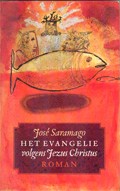
Arbeiderspers
1992 (Translated by Harrie Lemmens)
Language
Dutch
Het evangelie volgens Jezus Christus veroorzaakte bij verschijining in Portugal veel opschudding. Toen het boek door ministerieel ingrijpen werd geschrapt van de kandidatenlijst voor de Europese Literatuurprijs, kwam het tot een forse politieke rel. “Het bevat scènes, beweringen, uitroepen, gedachten, die een schrijver enkele eeuwen geleden op de brandstapel hadden gebracht, zonder recht op een begrafenis”, aldus een Portugese krant.José Saramago geeft in deze roman zijn eigen versie van het Nieuwe Testament. Voor hem is Jezus Christus een volledig menselijk wezen, derhalve also begiftigd met seksualiteit. Zijn partner is Maria Magdalena, die in dit boek uitgroeit tot een uiterst vitale vrouw, vol kracht en wijsheid. Ook de verhouding tussen God en Duivel komt bij Saramago op verrassende wijze in een nieuw licht te staan. Zijn evangelie, het evangelie van een atheïst, geeft een zeer persoonlijke, prikkelende en tegendraadse interpretatie van de aloude tradities.
Hungary
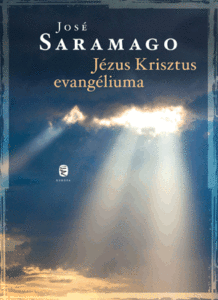
Saramago, the XX. század zseniális kétkedője újraértelmezi az Evangéliumok alapjául szolgáló krisztusi cselekedeteket és szenvedéstörténetet. Ez az 1991-ben megjelent, azóta már klasszikussávált regény érző, hús-vér emberként mutatja be Jézus Krisztust, aki kettős teher szorításában éli az életét. E világi apja, József a betlehemi gyermekgyilkosságban Játszott dicstelen szerepének terhét helyezi avállára, mivel csak a saját gyermekét igyekezett menteni, s másokat nem figyelmeztetett, a könyörtelen mennyei Atya pedig nem engedi letérni a számára kijelölt útról: muszáj-prófétává kellválnia, hogy Isten dicsőségét szolgálja.
Az első olvasatban szentségtörőnek is felfogható regény óriási botrányt és vitákat kavart megjelenése után. From Saramago-tól, az Istennel örökösen perlekedő istentagadótóltávol állt, hogy puszta botránykönyvet írjon: regényében a Megváltó történetének újramesélésével felveti a filozófiainak is mondható kérdést: ha mégsem úgy történt minden, ahogy az Evangéliumok leírják, akkor a keresztény Európa kétezer éves története homokra épült, és hiába volt az a sok kín és szenvedés, amellyel az Írások Istene a többi isten ellenében kiterjesztette a hatalmát.
“Saramago Evangéliumának” Krisztusa nem a reá kiszabott kereszthalállal, hanem földi sorsának vaillalásával – mint egykor a halhatatlanságot elutasító Gilgames -, az apai bűnért való vezekléssel és Mária Magdolna szerelmével teljesíti be a magára kiszabott sorsot.
A regény megjelenése után Portugália katolikus köreinek tiltakozása miatt Saramago nem kaphatta meg az Európai Unió Ariosto díját, ezért hazáját elhagyva önkéntes száműzetésbe vonult, sa Spanyolországhoz tartozó Lanzarote szigetén élt 2010-ben bekövetkezett haláláig.
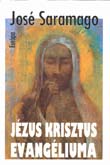
Saramago, the XX. század zseniális kétkedője újraértelmezi az Evangéliumok alapjául szolgáló krisztusi cselekedeteket és szenvedéstörténetet. Ez az 1991-ben megjelent, azóta már klasszikussávált regény érző, hús-vér emberként mutatja be Jézus Krisztust, aki kettős teher szorításában éli az életét. E világi apja, József a betlehemi gyermekgyilkosságban Játszott dicstelen szerepének terhét helyezi avállára, mivel csak a saját gyermekét igyekezett menteni, s másokat nem figyelmeztetett, a könyörtelen mennyei Atya pedig nem engedi letérni a számára kijelölt útról: muszáj-prófétává kellválnia, hogy Isten dicsőségét szolgálja.
Az első olvasatban szentségtörőnek is felfogható regény óriási botrányt és vitákat kavart megjelenése után. From Saramago-tól, az Istennel örökösen perlekedő istentagadótóltávol állt, hogy puszta botránykönyvet írjon: regényében a Megváltó történetének újramesélésével felveti a filozófiainak is mondható kérdést: ha mégsem úgy történt minden, ahogy az Evangéliumok leírják, akkor a keresztény Európa kétezer éves története homokra épült, és hiába volt az a sok kín és szenvedés, amellyel az Írások Istene a többi isten ellenében kiterjesztette a hatalmát.
“Saramago Evangéliumának” Krisztusa nem a reá kiszabott kereszthalállal, hanem földi sorsának vaillalásával – mint egykor a halhatatlanságot elutasító Gilgames -, az apai bűnért való vezekléssel és Mária Magdolna szerelmével teljesíti be a magára kiszabott sorsot.
A regény megjelenése után Portugália katolikus köreinek tiltakozása miatt Saramago nem kaphatta meg az Európai Unió Ariosto díját, ezért hazáját elhagyva önkéntes száműzetésbe vonult, sa Spanyolországhoz tartozó Lanzarote szigetén élt 2010-ben bekövetkezett haláláig.
India
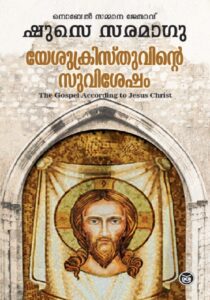
പോർച്ചുഗീസ് സാഹിത്യക്കാരനും നോബേൽ സാഹിത്യ ജേതാവുമായ ഷൂസെ സരമാഗുവിന്റെ
ദ ഗോസ്പൽ അക്കോഡിംങ്ങ് ടു ജീസസ്സ് ക്രൈസ്റ്റ് എന്ന പുസ്തകത്തിന്റെ മലയാള പരിഭാഷ
‘'യേശുക്രിസ്തുവിന്റെ സുവിശേഷം' , പുതിയ പതിപ്പ് ഇപ്പോള് വിപണിയില്. സരമാഗുവിന്റെ ഏറ്റവും വിവാദമുയര്ത്തിയ കൃതിയാണ് യേശുക്രിസ്തുവിന്റെ സുവിശേഷം. ക്രിസ്തുമതത്തിന്റെ മൂല്യങ്ങളിലേക്കിറങ്ങിച്ചെന്നുകൊണ്ടുളള ഒരന്വേഷണമാണിത്. ഇരുണ്ട യാഥാര്ത്ഥ്യങ്ങളും വിചിത്രകല്പനകളും ഇഴചേരുന്ന പ്രകോപനപരമായ ആഖ്യായിക.
ബൈബിളിലെ യേശുവിനെ കാല്പനികമായി പുന:സൃഷ്ടിക്കുകയാണ് സരമാഗു ഈ നോവലിൽ. വികാരവിക്ഷോഭങ്ങളും, മനുഷ്യ
സഹജമായ ദൗർബല്യങ്ങളും ശങ്കകളുമൊക്കയുള്ള ഒരു പച്ച മനുഷ്യനാണ് നോവലിലെ യേശു. ക്രൈസ്തവ വിശ്വാസികളുടെ, പ്രത്യേകിച്ച് റോമൻ കത്തോലിക്ക സഭയുടെ കടുത്ത വിമർശനങ്ങളും പുസ്തക പ്രേമികളിൽ നിന്നും ധാരാളം അനുമോദനങ്ങളും നേടിയ കൃതിയാണിത്.
പോർച്ചുഗിസ് ഭാഷയിൽ നോബൽ സമ്മാനം ലഭിക്കുന്ന ആദ്യത്തെ സാഹിത്യകാരനാണ് ഷൂസെ സരമാഗു. ചരിത്രാധിഷ്ടിതവും ഭാവനാസമ്പന്നവുമായ നോവലുകളിലൂടെ ലോകശ്രദ്ധയാകർഷിച്ചു. ചരിത്രസംഭവങ്ങളുടെ അട്ടിമറികളെക്കുറിച്ചുള്ള വീക്ഷണകോണുകളാണ് ഹോസെ സരമാഗുവിന്റെ കൃതികളിലെ ഒരു പൊതുവായ വിഷയം. ഔദ്യോഗിക കഥാതന്തുവിനെക്കാൾ സരമാഗോ മാനുഷിക വശങ്ങൾക്ക് പ്രാധാന്യം കൊടുക്കുന്നു. പോർച്ചുഗിസ് ചരിത്രവുമായി ബന്ധപ്പെട്ട അതിസൂക്ഷ്മമായ വ്യാജോക്തിയും സമ്പന്നമായ ഭാവനയും നിറഞ്ഞ ഇദ്ദേഹത്തിന്റെ കൃതികളിൽ പലതും വിവിധ ഭാഷകളിലേയ്ക്ക് വിവർത്തനം ചെയ്തിട്ടുണ്ട് .
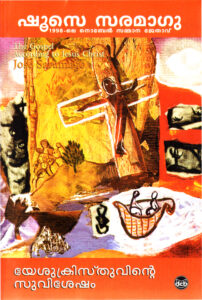
പോർച്ചുഗീസ് സാഹിത്യക്കാരനും നോബേൽ സാഹിത്യ ജേതാവുമായ ഷൂസെ സരമാഗുവിന്റെ
ദ ഗോസ്പൽ അക്കോഡിംങ്ങ് ടു ജീസസ്സ് ക്രൈസ്റ്റ് എന്ന പുസ്തകത്തിന്റെ മലയാള പരിഭാഷ
‘'യേശുക്രിസ്തുവിന്റെ സുവിശേഷം' , പുതിയ പതിപ്പ് ഇപ്പോള് വിപണിയില്. സരമാഗുവിന്റെ ഏറ്റവും വിവാദമുയര്ത്തിയ കൃതിയാണ് യേശുക്രിസ്തുവിന്റെ സുവിശേഷം. ക്രിസ്തുമതത്തിന്റെ മൂല്യങ്ങളിലേക്കിറങ്ങിച്ചെന്നുകൊണ്ടുളള ഒരന്വേഷണമാണിത്. ഇരുണ്ട യാഥാര്ത്ഥ്യങ്ങളും വിചിത്രകല്പനകളും ഇഴചേരുന്ന പ്രകോപനപരമായ ആഖ്യായിക.
ബൈബിളിലെ യേശുവിനെ കാല്പനികമായി പുന:സൃഷ്ടിക്കുകയാണ് സരമാഗു ഈ നോവലിൽ. വികാരവിക്ഷോഭങ്ങളും, മനുഷ്യ
സഹജമായ ദൗർബല്യങ്ങളും ശങ്കകളുമൊക്കയുള്ള ഒരു പച്ച മനുഷ്യനാണ് നോവലിലെ യേശു. ക്രൈസ്തവ വിശ്വാസികളുടെ, പ്രത്യേകിച്ച് റോമൻ കത്തോലിക്ക സഭയുടെ കടുത്ത വിമർശനങ്ങളും പുസ്തക പ്രേമികളിൽ നിന്നും ധാരാളം അനുമോദനങ്ങളും നേടിയ കൃതിയാണിത്.
പോർച്ചുഗിസ് ഭാഷയിൽ നോബൽ സമ്മാനം ലഭിക്കുന്ന ആദ്യത്തെ സാഹിത്യകാരനാണ് ഷൂസെ സരമാഗു. ചരിത്രാധിഷ്ടിതവും ഭാവനാസമ്പന്നവുമായ നോവലുകളിലൂടെ ലോകശ്രദ്ധയാകർഷിച്ചു. ചരിത്രസംഭവങ്ങളുടെ അട്ടിമറികളെക്കുറിച്ചുള്ള വീക്ഷണകോണുകളാണ് ഹോസെ സരമാഗുവിന്റെ കൃതികളിലെ ഒരു പൊതുവായ വിഷയം. ഔദ്യോഗിക കഥാതന്തുവിനെക്കാൾ സരമാഗോ മാനുഷിക വശങ്ങൾക്ക് പ്രാധാന്യം കൊടുക്കുന്നു. പോർച്ചുഗിസ് ചരിത്രവുമായി ബന്ധപ്പെട്ട അതിസൂക്ഷ്മമായ വ്യാജോക്തിയും സമ്പന്നമായ ഭാവനയും നിറഞ്ഞ ഇദ്ദേഹത്തിന്റെ കൃതികളിൽ പലതും വിവിധ ഭാഷകളിലേയ്ക്ക് വിവർത്തനം ചെയ്തിട്ടുണ്ട് .
Israel
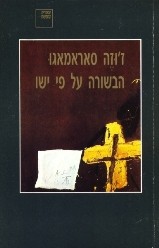
מרים טבעון)]מנקודת-ראותו של מספר בן זמננו. זהו ספר עז על שלטון, קורבן ועקידה. בחריפות מדהימה הוא “מפרק” את סיפורי הברית-החדשה – לאו דווקא באמצעות הסבר פסיכולוגי-ריאליסטי של הטקסט הדתי, שהיינו מצפים לו מאתאיסט. ישו של סאראמאגו, שהידועה-בציבור שלו היא מרים המיגדלית, מסרב למות כמשיח של דת חדשה ומעדיף למות כמלך היהודים, כדי לסכל את תוכניתו האימפריאליסטית של אל, שמאס באלוהותו על עם קטן ומבקש להקים לו כנסיה כלל-עולמית. אבל מאחר שהרצון האלוהי מוחלט, והחופש האנושי הוא רק למרוד ולהיענש – מנוצל גם המרד של ישו במסגרת התוכנית האלוהית, כי אין טוב לייסוד דת חדשה ממוות מכמיר-רחמים של משיח. אלוהים של סאראמאגו נברא על-ידי התודעה האנושית בצלמה, והוא משקף את גבולותיה. הוא מניפולטיבי, ציני ומחושב, תאֵו שלטון ודם קורבנות. דווקא השטן הדמויות מעוררות האהדה בספר. מבחינה פסיכולוגית, סיפורו של ישו הוא סיפור אשמתו של אביו הנגר יוסף, על שלא מנע את טבח התינוקות שפקד הורדוס בבית-לחם, ורק הציל את בנו – ובעצם אשמתו על מאווייו לעקוד את בנו, שמתגלגלת לחרדה של הבן שאביו ירצח אותו. כך מייהד סאראמאגו את הנצרות (בתיווכו הסמוי של פרויד) והופך את יחסי אברהם-יצחק לדגם היסודי שלה. אבל הנושאים “הגדולים” הללו – מהם לעומת שיחה קומית אחת של האם מרים עם מלאך על חיי המין של אלוהים, כשבא זה להודיע לה שאלוהים מהל את זרעו בזרע בעלה (“לא היית אלא אם פונדקאית”); או סיפור מצמרר כגון צליבתו של האב יוסף בציפורי על-ידי הרומאים, כשחסר להם צלוב מספר ארבעים להשלמת הסימטריה. 'הבשורה על פי ישו', אולי הרומאן הנועז ביותר של סאראמאגו עד כה, שעורר שערורייה ממשלתית בפורטוגל, מגלה שוב את יכולת התיאור המופלאה שלו, השנינה, העומק הפסיכולוגי, ובעיקר היכולת להתיך יחד הומור עם סיפור קורע-לב וחכם.
Italy
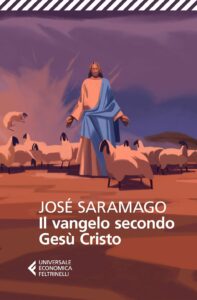
“When arriverà, o Signore, il giorno in cui verrai a noi per riconoscere i tuoi errori dinanzi agli uomini?”
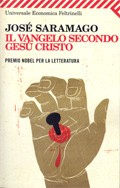
In his powerful description of the evangelical story, Saramago narrates a Gesù Cristo in person and for every human being. Il figlio di Dio incarna così i dubbi e le sufferenze propria della condizione universale dell'uomo. Dalla is born to Betlemme at death south of Golgota, facing the medesime experience described in Vangelo, according to an earthly perspective, strong in critical spirit, logical sense and piety. I don't feel like I'm miraculous, I'm aware of the essence of the will of a distant and indifferent priest to the pain he provokes. The series of disgrace, stragi and death at the cost of the resistance of Gesù, thin at the non-enclosed and non-accepted extent of the fate of the sacrificial victim, reveals an uncanny occasion for a rifle in the opposite direction for good and evil on earth, the assurdità di fare il giusto tramite l'ingiusto, l'inesorabilità della colpa, l'imperscrutabile senso della vita e la sconcertante ambiguità della divinità.
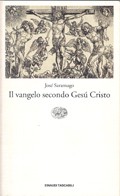
Einaudi
2002 (paperback edition) (Translated by Rita Desti)
Language
Italian
Un'appassionata, folgorante rivisitazione del Vangelo. «Come all in the figment of his mother, the figlio of Giuseppe and Maria born from the blood of his mother, visible from his mucosità and suffering in silence». di Saramago. Come pure è quello che pú di tutti ha scatenato critiche feroci da parte del clergy orthodosso sia portoghese sia italiano che ha definito blasphemo e sacrilego il romanzo. A Vangelo, invece, terribly human, and that allows the letter to feel «spiritually» vicino alla figura del Cristo, di un Gesú responds to the human dimension, «pover'uomo» as much as «poveri uomini» of this world, peccatori and non. Prima, neonato comes all the way through, because in perenne a lotta tra questo mondo, quello degli uomini e delle donne, dell'amore e del dolore terreni, e il mondo soprannaturale – quello del Padre -, che non riesce a capire, i cui fini, e confini, sono a lui, come a tutti gli uomini, ignoti e imperscrutabili. Fino alla morte, non desiderata e non voluta, lui stesso ignara vittima sacrificea a una divinità indifferente, ingannato.
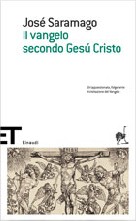
Einaudi
2002 (paperback edition) (Translated by Rita Desti)
Language
Italian
Un'appassionata, folgorante rivisitazione del Vangelo. «Come all in the figment of his mother, the figlio of Giuseppe and Maria born from the blood of his mother, visible from his mucosità and suffering in silence». di Saramago. Come pure è quello che pú di tutti ha scatenato critiche feroci da parte del clergy orthodosso sia portoghese sia italiano che ha definito blasphemo e sacrilego il romanzo. A Vangelo, invece, terribly human, and that allows the letter to feel «spiritually» vicino alla figura del Cristo, di un Gesú responds to the human dimension, «pover'uomo» as much as «poveri uomini» of this world, peccatori and non. Prima, neonato comes all the way through, because in perenne a lotta tra questo mondo, quello degli uomini e delle donne, dell'amore e del dolore terreni, e il mondo soprannaturale – quello del Padre -, che non riesce a capire, i cui fini, e confini, sono a lui, come a tutti gli uomini, ignoti e imperscrutabili. Fino alla morte, non desiderata e non voluta, lui stesso ignara vittima sacrificea a una divinità indifferente, ingannato.
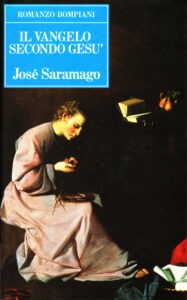
José Saramago, writer for his operation in raccontato di re e assedi, di rivoluzioni e conquiste, di conventi e latifondi “affronta” in this book on the page of the New Testament that narrates the life of Christ, from Betlemme al Golgota. Sullo sfondo di una Palestine sconvolta da occupazioni sanguinosis, adopting pesonaggi e resoconti di testi scari e apocrifi, con la superb prosa que ha contradistinto i momenti più alti alti del suo tracorso letterario, nel Vangelo secondo Gesù Saramago put in scene il drama di un uomo che neggli enigma Its smell pursues an irrevocable salvezza and proposes a rappresentation of the radiant and disconcerting divine: it does not result in a romanzo dove il reale if it encompasses all images, summer and false, ancient and new.
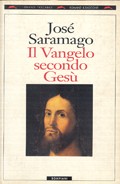
José Saramago, writer for his operation in raccontato di re e assedi, di rivoluzioni e conquiste, di conventi e latifondi “affronta” in this book on the page of the New Testament that narrates the life of Christ, from Betlemme al Golgota. Sullo sfondo di una Palestine sconvolta da occupazioni sanguinosis, adopting pesonaggi e resoconti di testi scari e apocrifi, con la superb prosa que ha contradistinto i momenti più alti alti del suo tracorso letterario, nel Vangelo secondo Gesù Saramago put in scene il drama di un uomo che neggli enigma Its smell pursues an irrevocable salvezza and proposes a rappresentation of the radiant and disconcerting divine: it does not result in a romanzo dove il reale if it encompasses all images, summer and false, ancient and new.
Lebanon
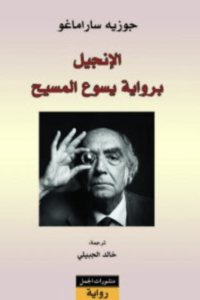
Al-Kamel Verlag
2017
Language
Lebanese
Al-Kamel Verlag
2017
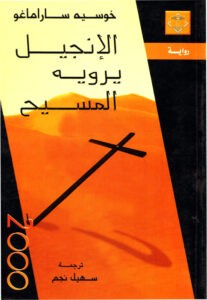
Dar Al-arabi
2000 (Translated by Sohail Estrela)
Language
Lebanese
Dar Al-arabi
2000 (Translated by Sohail Estrela)
Lithuania
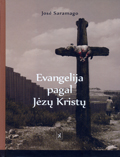
Leidykla „Kitos knygos“ neseniai išleido skandalingąjį portugalų rašytojo José Saramago (1922−2010) romaną „Evangelija pagal Jėzų Kristų“, kuris pasakoja dramatišką Jėzaus – paprasto žmogaus, o ne Dievo sūnaus, – gyvenimo istoriją. Savaip perteikdamas biblinius įvykius, autorius sukūrė itin žmogiško ir žemiško, tačiau esą humaniškesnio net už patį Dievą Jėzaus paveikslą. Dėl šios knygos kilo konfliktas su to meto valdžia, ir autorius buvo priverstas palikti gimtąją šalį. cenzūra, tačiau faktas, kad knyga buvo uždrausta demokratijos sąlygomis, mane skaudžiai nuvylė ir privertė persikelti.„ – prisimena J. Saramago.
„Evangelijoje pagal Jėzų Kristų“ – aistringoje bei vaizdingoje literatūrinėje fantazijoje – perteikiama ne tik Jėzaus, bet ir iki šiol negirdėta jo tėvo Juozapo kaltės drama. Autorius savaip interpretuoja evangelinę pabėgimo iš Egipto sceną, kada Erodas pasiuntė kareivius nužudyti visus mažesnius nei trejų metų berniukus. J. Saramago atkreipė dėmesį, kad Juozapas nieko nedarė, kai visi nepaliaujamai beldėsi į kaimynų duris norėdami įspėti, kad šie paslėptų savo vaikus. Ši scene lid pagrindiniu Romano varikliu: Juozapas prisiima atsakomybę už vaikų mirtis, kurių buvo galima išvengti, o šį kaltės jausmą vėliau paveldi Jėzus.
Romanas pasižymi itin vaizdinga ir žodinga kalba. Prie? kurį paauglystėje Jėzus ganė avis.
Autorius prisipažįsta, kad jo knyga yra eretiška: „Nenoriu teigti, kad šventvagiška, bet ji akivaizdžiai eretiška. Nukrypau nuo kanono, nuo tradicijos. „Evangelijoje pagal Jėzų Kristų“ pateikiamas ne tik kitoks požiūris į evangelijų tekstus, bet ir kitoks požiūris į Jėzų, Mariją, Juozapą, Mariją Magdalietę. Mano romane Marija yra tiesiog moteris, Juozapas – paprastas vyras, lygiai taip pat visi kiti – žmonės, kaip mes patys, kaip jūs, kaip aš, kaip visi, vaikščiojantieji greta.“
Autorius pripažįsta, kad knyga gali nepatikti konservatyviems ir tradiciškiems katalikams, tačiau yra įsitikinęs, jog skaitytoją ji būtinai ras: „Ne paslaptis, kad daugeliui žmonių, katalikams ir netgi kai kuriems teologams tapo aišku, kad Romanas vertas tikinčiųjų pago, nes knygoje Jėzus itin gerbiamas.“
José Saramago laikomas vienu įdomiausių XX a. rašytojų. 1998 m. jam paskirta Nobelio literatūros premija. Manoma, kad ši premija paskirta būtent už „Evangeliją pagal Jėzų Kristų“.
Mexico
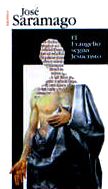
El Evangelio según Jesucristo responds to the desire of a man and a writer to excavate the roots of his own civilization, in the mystery of his tradition, to extract the essential questions: Who is this our God, first Hebrew and now Christian, who wants the blood, the death, so that it can be restored is the balance of a world that is nourished only by its laws? How can the new law be the law of Love if the mortgage of eternal damnation still weighs on the man? How can a man think of himself as a divine creature worthy of immortality, if throughout his existence he must submit to a law of terror that pre-exists and is external to him? Why should we fear eternal punishment when the punishment, for the just, should be in this life, in remordence and in the consciousness of our indignity? El Evangelio de José Saramago is all like that, tragically problematic, and it would be absurd to condemn him with laws, which are not his own laws, literary, poetic and philosophical. Here we do not deny the divine, the latent religion in the heart of every man: what we have to do is interrogate it, question it, accuse it. Passionately, religiously. Like Milton, situated on the side of the loser, who is always, we never forget him, a fallen angel. Luciana Stegagno Picchio
Norway
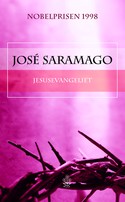
José Saramagos mest ufordrende og merkverdige bok. Med dyptgående kunnskaper om evangeliene omskriver og gjenforteller han historien om Jesu liv. I forgrunnen står snekker Josef, in mann som pines av skyldfølelse fordi han sørget for å network sin egen familie unna Herodes´ trusler, men unnlot å advare andre med nyfødte guttebarn.Vi følger historien om Jesu vandring på jorden, med Maria fra Magdalena ved sin side, i møte med mirakelmenn, fiskere, tollere og ikke minst djevelen selv. En historie som kan både provosere og åpne øyne.Saramago ble innstilt til den europeiske litteraturprisen for denne boken.
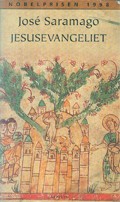
José Saramagos mest ufordrende og merkverdige bok. Med dyptgående kunnskaper om evangeliene omskriver og gjenforteller han historien om Jesu liv. I forgrunnen står snekker Josef, in mann som pines av skyldfølelse fordi han sørget for å network sin egen familie unna Herodes´ trusler, men unnlot å advare andre med nyfødte guttebarn.Vi følger historien om Jesu vandring på jorden, med Maria fra Magdalena ved sin side, i møte med mirakelmenn, fiskere, tollere og ikke minst djevelen selv. En historie som kan både provosere og åpne øyne.Saramago ble innstilt til den europeiske litteraturprisen for denne boken.
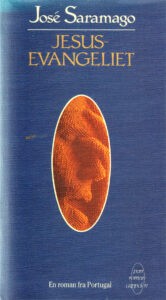
José Saramagos mest ufordrende og merkverdige bok. Med dyptgående kunnskaper om evangeliene omskriver og gjenforteller han historien om Jesu liv. I forgrunnen står snekker Josef, in mann som pines av skyldfølelse fordi han sørget for å network sin egen familie unna Herodes´ trusler, men unnlot å advare andre med nyfødte guttebarn.Vi følger historien om Jesu vandring på jorden, med Maria fra Magdalena ved sin side, i møte med mirakelmenn, fiskere, tollere og ikke minst djevelen selv. En historie som kan både provosere og åpne øyne.Saramago ble innstilt til den europeiske litteraturprisen for denne boken.
Poland
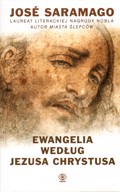
Najbardziej kontrowersyjna powieść laureata literackiej Nagrody NoblaNajbardziej kontrowersyjna powieść laureata literackiej Nagrody NoblaKsiążka opowiada o życiu Jezusa z Nazaretu w jego najbardziej ludzkim wymiarze, jakiego nigdy nie odważamy się objąć wyobraźnią. Poznajemy trudne relacje młodego Jezusa z rodziną i związek z Marią Magdaleną, małżeństwo Marii z Józefem i ich codzienne życie, ówczesne zwyczaje, towarzyszące wszystkim emocje i osobiste dylematy. Jesteśmy świadkami jedynego w swoim rodzaju spotkania Jezusa z Bogiem i szatanem. Wszystko to autor odtwarza – czy raczej tworzy – z wizjonerską wręcz pasją i ogromną dbałością o realia.
Ta wyjątkowa powieść, którą czyta się jak autobiografię Jezusa, ukazuje absurdalność wymagań Boga żądnego władzy i wyznawców, każe się zastanawiać nad sensem ofiary Chrystusa i naturą szatana gotowegopójść z Bogiem na kompromis.
Ewangelia według Jezusa Chrystusa skłania do głębokiej refleksji, prowokuje, lecz nie chceobrażać. To inspire you to poruszająca reading.
José Saramago (1922-2010), laureat literackiej Nagrody Nobla z 1998 r. i najpopularniejszy na świecie prozaik portugalski, sławę zdobył dopiero w sześćdziesiątym roku życia swoją trzecią powieścią Baltazar i Blimunda, nagrodzoną prestiżową nagrodą portugalskiego PEN Clubu oraz Nagrodą Literacką Miasta Lizbona.
Nakładem Domu Wydawniczego REBIS ukazały się dotychczas: Baltazar i Blimunda, Wszystkie imiona, Rok śmierci Ricarda Reisa, Kamienna tratwa, Historia oblężenia Lizbony, Miasto ślepców i Miasto białych kart oraz O malarstwie i kaligrafii.
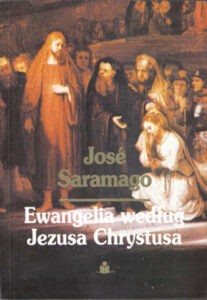
SAWW
1992 (Translated by Cezary Długosz)
Language
Polish
Gdyby w dwudziestym wieku palono ludzi na stosach, zapewne w ten sposób skończyłby autor “Ewangelii według Jezusa Chrystusa”, powieści bedacej głeboka I odważna refleksja nad dwoma tysiacleciami chrześcijaństwa. Narzucajac sobie ostra dyscypline narracyjna, Saramago konsekwentnie pokazuje Boga jako “czarny charakter”, zaś Jezusa jako dobrego człowieka sprzeciwiajacego sie Jego woli. Bóg jest uosobieniem złej, autorytarnej władzy żadnej krwi. Poczety w wynoku cielesnego współzycia Józefa I Marii Jezus unaocznia ludziom zbrodnie, jaka Bóg wobec nich popełnił. Według autor tej nowoczesnej “Ewangelii” człowieczeństwo Chrystusa dotyczy wszystkich aspektów życia I dlatego zwiazek z Maria Magdalena, jedyna jego miłościa, ma również tło. Pomimo ostrości spojrzenia, zupełnie nowych tez i interpretacji, Saramago zdaje sie nie przekraczać granic dobrego smaku. Ze spokojem I rozwaga probuje wypełniać “białe plamy” biblijnych Ewangelii, podkreślajac wielokrotnie subiektywność własnej wizji. Najnowsza powieść José Saramago, który należy do najwybitniejszych współczesnych pisorzy europejskich, potwierdza, że sztuka pisonia znakomitych powieści jeszcze nie zanikła.
UK
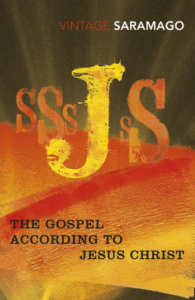
Saramago's Jesus is the son not of God but of Joseph. Mary Magdalene is his lover not his convert. In the wilderness he tussles not with the Devil – a kindly and necessary evil – but with God, a fallible, power-hungry autocrat. And he must die not for the sins of the fathers but for the sins of the Father. By investigating these simple inversions Saramago has woven a dark parable; a secular gospel of astonishing richness and depth.
‘'An original, wild and beautiful book' Times Literary Supplement
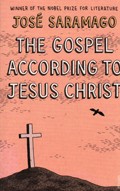
A retelling of the Gospel following the life of Christ from his conception to his crucifixion. The naive Jesus is the son not of God, but of Joseph. In the desert it is not Satan, but God that Christ tussles with, an autocrat with whom he has an unbalanced and unsettled relationship.”An original, wild and beautiful book”John Butt, Times Literary Supplement
“His greatest book… Saramago's novel is an extraordinary, eloquent heretical text, filled with deep compassion for humanity's suffering”
James Wood, New Republic
“This gospel is by a storyteller who makes everything exactly alive, who carries you breathlessly on a great river rush of prose.”
Michael Pye, Scotsman
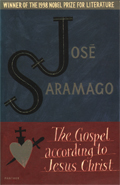
A retelling of the Gospel following the life of Christ from his conception to his crucifixion. The naive Jesus is the son not of God, but of Joseph. In the desert it is not Satan, but God that Christ tussles with, an autocrat with whom he has an unbalanced and unsettled relationship.”An original, wild and beautiful book”John Butt, Times Literary Supplement
“His greatest book… Saramago's novel is an extraordinary, eloquent heretical text, filled with deep compassion for humanity's suffering”
James Wood, New Republic
“This gospel is by a storyteller who makes everything exactly alive, who carries you breathlessly on a great river rush of prose.”
Michael Pye, Scotsman
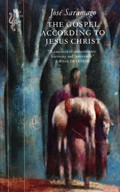
A retelling of the Gospel following the life of Christ from his conception to his crucifixion. The naive Jesus is the son not of God, but of Joseph. In the desert it is not Satan, but God that Christ tussles with, an autocrat with whom he has an unbalanced and unsettled relationship.”An original, wild and beautiful book”John Butt, Times Literary Supplement
“His greatest book… Saramago's novel is an extraordinary, eloquent heretical text, filled with deep compassion for humanity's suffering”
James Wood, New Republic
“This gospel is by a storyteller who makes everything exactly alive, who carries you breathlessly on a great river rush of prose.”
Michael Pye, Scotsman
Romania
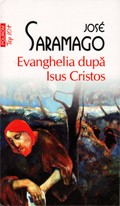
Cel mai polemic roman al lui Jose Saramago, Evanghelia dupa Isus Cristos (1991), a stirnit la aparitie puternice reactii din partea Bisericii si a provocat in mod indirect autoexilul autorului. Romanul reconstructed the apocryphal viata to Lui Isus if he was held responsible for the theme. Desi fusese instiintat ca se pregatea masacrul inocentilor, Iosif isi salveaza doar propriul copil si este urmarit pina la moarte de vina de a fi fost, prin omisiune, complicele crimei lui Irod. Inseparable from Diavol, umbra si acolitul sau, Dumnezeu nu ezita sa-si sacrifice unicul fiu pentru a-si satisface nemarginita sev de putere care, dupa sacrificiul lui Isus, va cere noi si noi varsari de singe: martiri, victimele Inchizitiei, multiplele asasinate din razboaiele religioase.
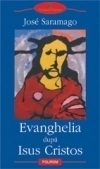
Cel mai polemic roman al lui Jose Saramago, Evanghelia dupa Isus Cristos (1991), a stirnit la aparitie puternice reactii din partea Bisericii si a provocat in mod indirect autoexilul autorului. Romanul reconstructed the apocryphal viata to Lui Isus if he was held responsible for the theme. Desi fusese instiintat ca se pregatea masacrul inocentilor, Iosif isi salveaza doar propriul copil si este urmarit pina la moarte de vina de a fi fost, prin omisiune, complicele crimei lui Irod. Inseparable from Diavol, umbra si acolitul sau, Dumnezeu nu ezita sa-si sacrifice unicul fiu pentru a-si satisface nemarginita sev de putere care, dupa sacrificiul lui Isus, va cere noi si noi varsari de singe: martiri, victimele Inchizitiei, multiplele asasinate din razboaiele religioase.
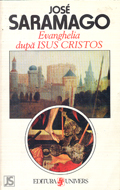
Univers
1999 (Translated by Mioara Caragea)
Language
Romanian
«Fiindcă mulăţi s-au apucat să alcătuiască o istirisire amănunţită despre lucrurile care s-au petrecut printre noi, după cum ni le-au încredinţat cei ce le-au văzut cu ochii lor de la început, That's it, I'm sorry, I'm sorry, preacinstite Teofil, după ce am făcut cercetări cu de-amănuntul asupra tuturor acestor lucruri de la obîrşia lor, să ţi le scriu în şir unele după altele, ca să poţi cunoaşte astfel temeinicia învăţăturilor pe care le-ai primit prin vi grai.»LUCA, 1, 1-4După Istoria asediului Lisabonai, Memoriallul mînăstirii şi Evanghelia după Isus Cristos, în would be by the author «José Saramago» vor apărea romanele: Anul morţii lui Ricardo Reis, Toate numele şi Eseu despre orbire.
Russia
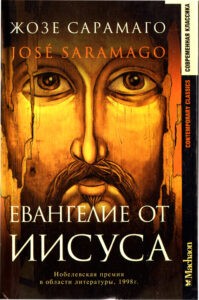
Одна из самых громких, даже скандальных книг ХХ века. Церковь обвинила автора в “профанации Священного Писания”, в “грубых нападках на Новый Завет”. Книга была запрещена в Португалии и Бразилии, фанатики жгли ее улицах... – за 4 месяца “Евангелие” было переведено 30 (!) языков и в буквальном смысле слова “гремело” по всей Европе и Латинской Америке; кроме того, in 1998 году, при вручении Сарамаго Нобелевской премии эта книга была отмечена особо. What do you think about your Церкви? Иисус у Сарамаго самый обыкновенный человек, ни в жизни, ни в смерти которого нет ничего божественного – он живет как все и желает того же, чего и все. Да, со временем он начинает чувствовать в себе какие-то странные перемены, но в чем, собственно, дело он начинает догадываться последним. Язык книги нарочито жесток, в нем нет места ни восторгам, ни сантиментам, ни обожанию: все просто и конкретно – как в жизни. Прочитав этот замечательный роман, поневоле начинаешь смотреть другими глазами и на Марию Магдалину, и на “соратников” Иисуса, да и на него самого.
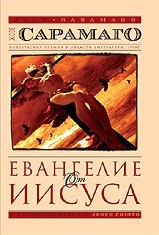
Одна из самых громких, даже скандальных книг ХХ века. Церковь обвинила автора в “профанации Священного Писания”, в “грубых нападках на Новый Завет”. Книга была запрещена в Португалии и Бразилии, фанатики жгли ее улицах... – за 4 месяца “Евангелие” было переведено 30 (!) языков и в буквальном смысле слова “гремело” по всей Европе и Латинской Америке; кроме того, in 1998 году, при вручении Сарамаго Нобелевской премии эта книга была отмечена особо. What do you think about your Церкви? Иисус у Сарамаго самый обыкновенный человек, ни в жизни, ни в смерти которого нет ничего божественного – он живет как все и желает того же, чего и все. Да, со временем он начинает чувствовать в себе какие-то странные перемены, но в чем, собственно, дело он начинает догадываться последним. Язык книги нарочито жесток, в нем нет места ни восторгам, ни сантиментам, ни обожанию: все просто и конкретно – как в жизни. Прочитав этот замечательный роман, поневоле начинаешь смотреть другими глазами и на Марию Магдалину, и на “соратников” Иисуса, да и на него самого.
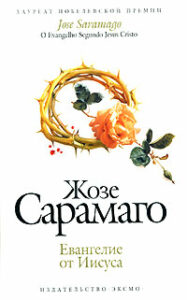
Жозе Сарамаго — один из крупнейших писателей современной Португалии, лауреат Нобелевской премии by по литературе (1998). В романе «Евангелие от Иисуса» он дает собственную — глубокую и оригинальную — трактовку эпизодов отыскать реальные причины тех страданий, которые претерпели
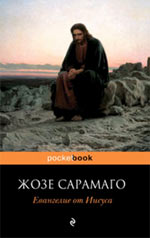
Жозе Сарамаго — один из крупнейших писателей современной Португалии, лауреат Нобелевской премии by по литературе (1998). В романе «Евангелие от Иисуса» он дает собственную — глубокую и оригинальную — трактовку эпизодов отыскать реальные причины тех страданий, которые претерпели
Serbia
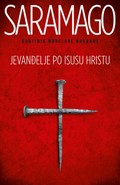
Njеgоvо је tеlо lеžаlо, nаpеtо, čvrstо, ukrućеnо, а nаd njimе stајаšе оnа, Mаriја Mаgdаlеnа, gоvоrеći, Оpusti sе, bеz brigе, miruј, pusti dа sе ја brinеm о tеbi, i tаdа оsеti dа је јеdаn dео njеgоvоg tеlа prоdrо u njеnо tеlо, kаkо sе оkо njеgа stеžе prstеn оd vаtrе, u nаlеtimа, kаkо mu tеlо trеsе drhtаvicа, kао ribа kоја sе trzа, bоri sе i bеži uz krik, ali nеmоgućе, ribе nе urliču, tо је biо njеgоv krik, dоk је Mаriја, stеnjući, pаlа prеkо njеga žеlеći dа sа njеgоvih usаnа pоpiје krik, pоhlеpnim pоljupcеm kојim је izаzvаlа јоš јеdаn bеskrајni tаlаs drhtаvicе u Isusоvоm tеlu.U ovom jevanđelju po Saramagu Spasitelj nosi auru čovečnosti daleko veću nego što tvrdi Biblija. Za jedne, bliske revnosnim hrišćanima, roman je bogohulno antijevanđelje, za druge impresivna priča o ljubavi i ljudskoj žrtvi, o dvadeset vekova ljudskih patnji koji su usledili.Roman koji je svojevremeno izazvao pravu buru u portugalskim i španskim konzervativnim krugovima, što je dovelo do cenzure kojom je pisoc sprečen da primi Evropsku nagradu za književnost, predstavlja još jednu potvrdu Saramagovog impresivnog stila i sklonosti da o ljudskoj sudbini progovori allegorično i provokativno, a Istovremeno na svima razumljiv način.
„Roman koji prosvetljuje svojim neumoljivim smislom za humour, nežnom strašću i poezijom.“ Los Angeles Times Book Review
„Pobeda čoveka nad legendom, umetnički besprekorno uobličena. Uzvišeno!“ Fransisko Migel
„Saramago dopušta svom pripovedaču da izlije svu žuč i gorčinu zbog zla, bede i patnje koji su u ime širenja hrišćanstva zadesili svet. Knjiga koja se ne sme propustiti.“ Bob Korbet
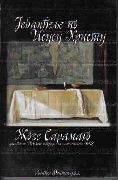
Franka Language
1999 (Trans.: Dejan Tiago Stanković)
Language
Serbian
Franka Language
1999 (Trans.: Dejan Tiago Stanković)
Sweden
Turkey
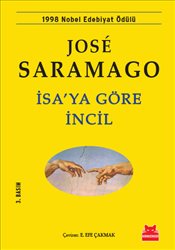
Kirmizi Kedi
Language
Turkish
Nobel Edebiyat Ödülü sahibi José Saramago, tartışmalara yol açan romanı İsaya farklı bir bakış açısıyla anlatıyor. Anne rahmine düşmesinden başlayarak bir çocuk, bir genç olarak zayıflıklarını, öfkelerini, heyecanlarını, kararsızlıklarını ve Mecdelli Meryemle olan aşk ilişkisini romanına yansıtırken İsayı, Tanrının oğlu ve bir peygamberden ziyade insan olarak gösteriyor. İsanın ve Tanrının üzerindeki kutsallık örtüsünü kaldırıyor ve böylelikle soru sormanın, sorgulamanın önünü açıyor. Din ve inanç adına yapılan şiddet dolu eylemlerle karanlık bir mesel; şaşırtıcı zenginlikleriyle ve derinlikleriyle dünyevi bir İncil olan bu roman, Saramagonun ülkesini terk etmesine yol açmıştı. Original, vahşi ve çok güzel bir kitap.
John Butt, Times Literary Supplement
Yazarın en iyi kitabı… Saramagonun romanı, insanlığın ıstırabına karşı yoğun bir şefkatle dolu, olağanüstü, dokunaklı, inanışlara ters düşen bir anlatı.
James Wood, New Republic
Vahşi bir zekâyla, yumuşak bir tutkuyla ve şiirsellikle aydınlatılmış.
Los Angeles
Times Book Review
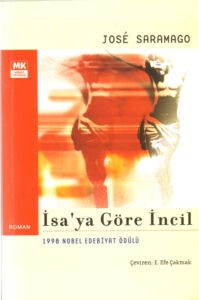
Merkez
2006
Language
Turkish
Merkez
2006
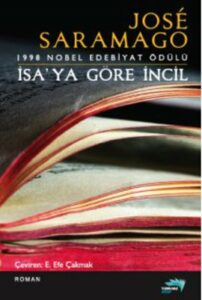
İsa'ya Göre İncil, Roma buyunduruğu altındaki Filistin'de, İsrailoğlullarının bağımsızlığı için savaşan Celileli Yahuda'nın isyancı birliklerinin terör estirdiği bir dönemde, sefalet içindeki bir halkın tek umudu olan Nasıralı İsa'nın mucizelerini, ama bunun yanı sıra aşklarını, sevinçlerini ve hayal kırıklıklarını, Tanrı'yla ve Şeytan'la mücadelesini de anlatan bir roman.
Matta, Markos, Luka ve Yuhanna'nın yanında, İncil yazarlarını arasına kendi adını da yazdıran Nobel ödüllü José Saramago, Hıristiyanlığın kan ve gözyaşı dolu iki bin yılının sonunda, öyküyü İsa'nın gözünden tekrar anlatırken, Tanrı'nın bu dünyadaki işlerini açıklamak için diyor ki: “Ey İnsanoğlu, O'nu affet, çünkü ne yaptığını bilmiyor.”
